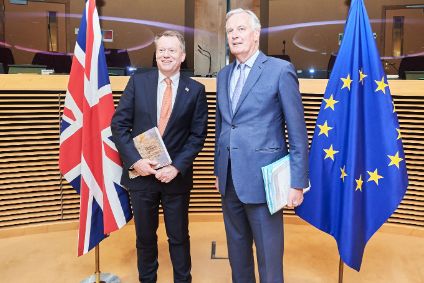
European food industry body FoodDrinkEurope (FDE) has called on negotiators trying to secure a trade deal between the UK and the EU to redouble their efforts.
The UK is due to go it alone when the post-Brexit transition period ends on 31 December and UK and EU negotiating teams are currently engaged in last ditch talks aimed at forging a trade deal.

Discover B2B Marketing That Performs
Combine business intelligence and editorial excellence to reach engaged professionals across 36 leading media platforms.
FDE has issued a statement in relation to the talks in conjunction with Copa and Cogeca, which represent farmers and agri-cooperatives in the EU, CELCAA, the EU umbrella association representing the trade in agri-food and commodities, and EFFAT, European Federation of Food, Agriculture and Tourism Trade Unions.
It said: “Our priority is to safeguard jobs and allow the agri-food sector to thrive. At this eleventh hour we call on negotiators to strike a comprehensive tariff and quota-free trade agreement with close harmonisation of rules, including on sanitary and phytosanitary measures and technical barriers to trade. We must strive for a level playing field, including on workers’ rights.”
It has set out a series of “urgent requests” to the governments involved which it said it would like to see met irrespective of whether a deal is struck or not.
“On conclusion of the negotiations, we will need immediate clarity on future UK-EU trade rules to avoid more economic turmoil and job uncertainty for a sector already badly bruised by the Covid-19 pandemic,” it said.

US Tariffs are shifting - will you react or anticipate?
Don’t let policy changes catch you off guard. Stay proactive with real-time data and expert analysis.
By GlobalData"The UK will leave the Single Market and the Customs Union which will mean customs procedures, regulatory burdens and rising transport costs. A no-deal scenario, with the imposition of tariffs and heavy customs requirements, will create a dire situation. Given agri-food businesses will likely feel a greater impact from Brexit than other sectors, specific measures will be needed for a smooth transition, as well as broad support from the EU Brexit Adjustment Reserve."
It has also asked for public authorities to organise "quick and effective information campaigns" to help businesses understand the new rules and plan their operations, for workers' rights to be protected and businesses given the assistance they need to maintain job security for employees working in the European agri-food chain.
"Constant dialogue with the European Commission and UK authorities, as well as with social partners and stakeholders, will be essential to respond to potential disruptions and emergencies that will emerge after 31 December 2020," it said.
"Whatever the outcome of the negotiations, we encourage the EU and UK to put any acrimony behind them in favour of a strong and productive relationship for the benefit of all."





